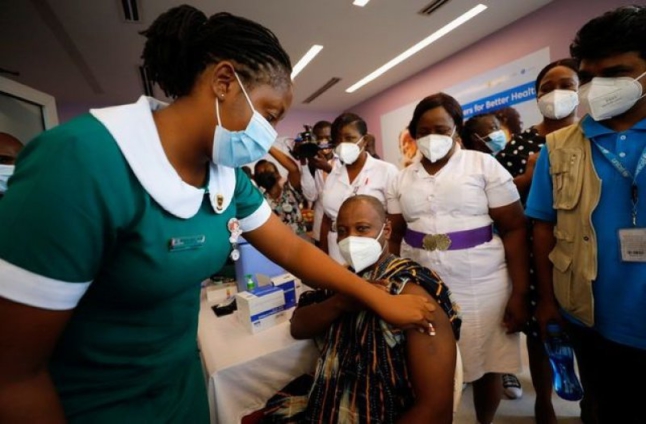More than 100,000 people have received their second dose of the AstraZeneca Covid-19 vaccine as of Sunday, May 23, data from the Ghana Health Service (GHS) has shown.
The exercise, which began on May 19, is expected to inoculate about 360,000 persons who received their first jab from March 1 to 9, this year.
Dr Franklin Asiedu-Boeko, Director of Public Health at the GHS, said those who received their first jab from March 10, would have their second dose in the next phase.
He told the Ghana News Agency (GNA) in an interview in Accra that 380,000 doses of vaccine had been specifically allocated to those in the first phase and said the exercise would not end on May 26 as stated earlier.
Dr Asiedu-Boeko described the exercise as impressive despite the failure of an online application introduced to make the exercise more effective.
“We are happy about the process so far because, despite complaints about the side effects of the vaccine, people are still interested in getting inoculated," he said.
Dr Asiedu-Boeko assured the public that government was still making efforts to acquire more vaccines to get more people vaccinated.
He assured the public that the plan to vaccinate 20 million Ghanaians before the end of the year was on course.
Dr Asiedu-Boeko reiterated the need for the public to keep adhering to the COVID-19 safety protocols by wearing facemasks, using alcohol-based hand sanitizers, coughing or sneezing into tissues, and washing of hands with soap under running water.
Ghana, on Tuesday, March 2, kicked off its mass COVID-19 vaccination exercise in 42 selected districts in the Greater Accra, Kumasi, and Western regions.
As of Friday, April 30, a total of 849,527 AstraZeneca vaccines had been administered to the public.
Ghana recorded its first case of Covid-19 on March 12, 2020. So far 92,513 cases have been confirmed with 783 deaths. There are 1583 confirmed cases.
The novel coronavirus was first recorded in the Wuhan city of China in December 2019.
Coronaviruses are a large group of viruses that are common among animals. In rare cases, they are what scientists call zoonotic, meaning they can be transmitted from animals to humans, according to the US Centers for Disease Control and Prevention.
It has an incubation period of four to six days and fatal, especially for those with a weakened immune system – the elderly and the very young. It could also result in pneumonia and bronchitis.
Latest Stories
-
Audit the state of Ghana’s health sector – Kwame Asiedu urges Mahama
12 minutes -
East Legon accident: Salifu Amoako’s son jailed 6 months
13 minutes -
Brenda Antwi Donkor – the unsung lady behind the most iconic TV productions
16 minutes -
MUSIGA mourns Naa Amanua of Wulomei fame
34 minutes -
Audit Agenda 111 lands and funds – Kwame Asiedu urges Mahama
41 minutes -
President Akufo-Addo commissioned mere buildings, not hospitals – Kwame Sarpong Asiedu
45 minutes -
David Ocloo joins Togolese side AS OTR Lomé as head coach
47 minutes -
The evolution of Ghana’s film industry: From local beginnings to global showcase
50 minutes -
Black Galaxies: Didi Dramani rallies support ahead of CHAN qualifier against Nigeria
1 hour -
Agenda 111 will not solve Ghana’s healthcare crisis – Kwame Sarpong Asiedu
1 hour -
“I never left the stage” – Fameye on London show mishap
1 hour -
I have a plan to win the league for Hearts Of Oak- Aboubakar Outtara
2 hours -
CIB Ghana celebrates induction of 110 Chartered Bankers, totaling 1,127 over five years
2 hours -
LPG consumption increases by 4% in 2023
2 hours -
Enjoying the Festive Season with Moderation in Mind
2 hours

